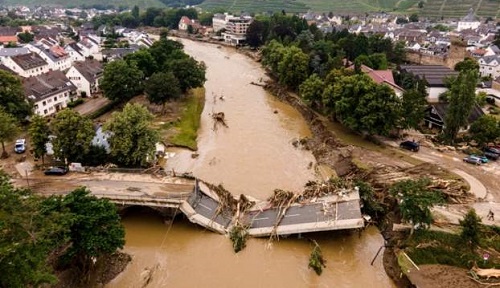16th July 2021 - Author: Matt Sheehan
Reinsurance News
Ernst Rauch, Chief Climate and Geo Scientist at Munich Re, has said that events such as the recent catastrophic flooding in Germany are “very likely related to climate change,” and are set to grow in both frequency and intensity.

Source: EPA
This week’s flooding has impacted many parts of Central and Western Europe, including Belgium, the Netherlands, and Switzerland, although Germany remains the worst affected.
The event is poised to become one of the costliest flood episodes on record, with re/insurance industry losses expected to reach into the billions of Euros.
In Germany, hundreds of people are missing and more than 100 lives have been claimed as rivers burst their banks, with reports of severe damage to property.
And it comes on top of a prolonged stretch of severe weather through the latter half of June, as storms racked up an insured bill that could reach $4.5 billion, according to Aon.
Weather conditions in June included thunderstorms, hail and even a tornado that hit the Czech Republic, with Germany, France, Belgium, the Netherlands and Switzerland again among those that were heavily impacted.
“We have observed a significant increase in damages and damage frequency over the past decades in the case of thunderstorms accompanied by local heavy rain, hail or tornadoes,” said Rauch, commenting on the recent flooding.
“There are clear indications that part of the growing damage cannot be explained solely by socio-economic factors, but is due to climate change,” he explained.
“The cause of the recent storms is a low pressure system that hardly moves forward and constantly brings new moisture. Such persistent weather patterns are becoming more frequent and are very likely related to climate change and in particular the rapid warming of the Arctic. We have to assume that these damages will increase in frequency and intensity.”
To combat the effects of climate change on natural catastrophes, and to reduce the exposure of governments and of the re/insurance industry, Rauch stressed that the issues of prevention must become much more prominent.
“In the long run, the expected increased damages are much more expensive than if we start now with prevention, which in the end will dampen the increase in damages,” he concluded.
No comments:
Post a Comment